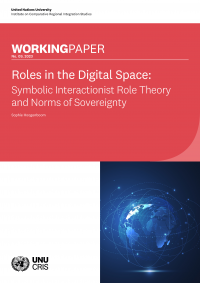Roles in the Digital Space: Symbolic Interactionist Role Theory and Norms of Sovereignty

Today, we are witnessing state and non-state actors attempting to create a role for themselves in relation to the digital realm, often with the use of varying interpretations and usages of the concept of digital sovereignty. This seems to signal a new understanding of the way in which the ‘digital’ should be governed and the role of sovereignty therein.
This theoretical paper wants to demonstrate the usefulness of Symbolic Interactionist Role Theory in furthering our understanding of the way in which roles in the digital realm come about and the function of (digital) sovereignty in this process. This paper argues for using central concepts of Symbolic Interactionist Role Theory: problematic situation, role-taking process, role-making process, and alter-casting as a conceptual scheme which can be used in empirical research to analyse the roles that specific actors are attempting to forge in relation to the digital realm as well as the usage of the notion of (digital)-sovereignty therein, which as this paper argues on the basis of Symbolic Interactionist Role Theory, can be understood and approached as being intertwined processes.
